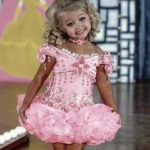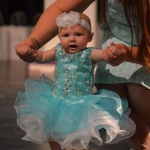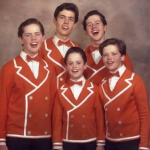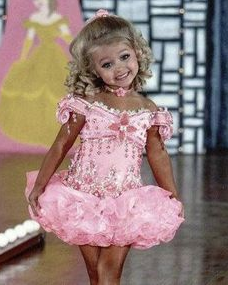Welcome back! Last week, we talked about how to change someone’s mind (or even your own). If you missed that blog and would like to catch up, click HERE.

This week is a mental health blog. It won’t be one you’ve seen very often on the internet. We are going to talk about the mental health effects of being a child star (this can encompass sports, modeling, acting, singing, or dancing). Now, you may say, “Linda…seriously…how many of your readers will even care about this subject?”. Well, I can tell you that right now, in my friends’ list alone, I know of three mama’s who have dreams for their children. It’s a topic worth writing about. It has to do with expectations, disappointments, and the need to always be “on” or be “perfect“. It’s important.

We’ve all seen them. The baby beauty pageants. The mom swearing up and down that their child loves performing (all the while the child is screaming and crying while mom yells “hold STILL, I’m doing your makeup!). The young girl being told she shouldn’t eat a piece of cake because her swimsuit won’t fit for the Miss Teen competition. The adult music star crying on camera because their childhood was taken from them. We inherently know this isn’t good, but do we ever look at our own family and ask the question, “does my child want to be in (fill in the blank…theater, sports, ?)“. Let’s talk about the plus and minus of being the star.
Before we go any further, I’d like to ask you to watch this short clip of Donny Osmond. It won’t take but a minute and it’s going to add to the content of the rest of this blog. Click on the link below, then click on the “Watch this video on Youtube” option. I didn’t want to embed the entire interview, just this patch. You only need to watch for 3 minutes, 30 seconds, and then my point will have easily been made. See you back here after this short break.
https://www.youtube.com/watch?v=40Aii5e4GmQ
A childhood stolen. No way to get it back. We hear these stories again and again and again. Some say it’s the parents trying to live out their own personal dreams, living vicariously through their kids. Some say it’s the children’s idea…they love it…they want to be just like (insert famous name here). And, in some cases, that’s very true. But how much does a child know about living a life of fame at the age of 6?
While we were certainly never famous, David and I originally met when our parents plopped us in a dance class at the tender age of 8, and we were assigned to be dance partners. (Obviously, this worked out for us 30 years later when we reconnected and married), but during those ten years we danced, acted, and sang on command? Not so pleasant.

Our days were scheduled for us. Practice times, studio times for more practice, criticisms (“no lunch break until you all get it right – clearly nobody bothered to practice at home“), snide remarks (“have you gained weight?”), jealous mother/child remarks (“my mom says your mom pays extra for your solos“), stage shows, fair performances, it went on and on and on. Once, when on stage, I remember looking into the fair audience and seeing kids I knew, feeling jealous that they could go on rides and I couldn’t. Jealous that they could leave and I could not.
Our experience was mild compared to what most child stars go through. The tears, (both from exhaustion and the feeling that one can never be as perfect as their parents/coaches/instructors want them to be) the anger, the depression, and the low self-esteem are prevalent in children who are forced into the limelight too early.
So why does this happen? Why can’t the formative years be set aside for learning the craft, rather than performing? Do the positives outweigh the negatives? Most children who perform at an early age go through life with very little “stage fright” (Or so it appears. In reality we have a frozen smile from years of being terrified to go on stage, yet being told to “smile“!). We learn to ignore what our needs are and to serve others ahead of self. Sometimes that’s good…sometimes that’s not good.
We make great public speakers because it feels normal, comfortable, like going home again. Most of us become leaders, mostly because we aren’t afraid to speak out. Most of us also become mentally ill to some degree or another. Anxiety being the top diagnosis.
Psychology Today writes: “Young actors must constantly cope with rejection, jealousy, self-scrutiny, obsessive thoughts, and the nonstop need to be perfect.

“These children are at high risk of becoming emotionally unstable and of becoming drug, alcohol, or sex abusers. Children at different ages display behavioral changes that might indicate that they are at risk. Those between the ages of 2 and 8 might exhibit the following signs of stress: regression (displaying infantile behaviors, thumb-sucking, bed-wetting), depression, crying, anxiety, clinging, and temper tantrums. Indications that teens are troubled include poor grades, change of friends, isolation, distancing from family, oversleeping, drug or alcohol abuse, eating disorders, cutting, lying, and keeping secrets.“
So that’s the bad news. The good news is this: If your child participates in theater, sports, or any other performative adventure like debate, or 4H where they show livestock, the benefits are shown to be tremendous IF it’s for FUN, not goals. Team sports are better than individual sports, and theater groups are better than one child alone going to an interview for America’s Got Talent. Teams develop Tribes. Children need to belong. They need to belong to a constructive group where there are collective goals and the youth are supportive of each other.
The answer to why does this happen is hopefully obvious. A six-year-old doesn’t understand fame. Their parents do. A six-year-old doesn’t think about performing on stage and winning a blue ribbon (until the first time they win one), the parents do. A six-year-old just likes to sing songs. Or throw a baseball. They like to play. It’s the parents who decide otherwise for them and their futures. That’s why this happens.

Those of you who know me, know I have had a life long love for the Osmond Family. A year ago, my son gifted me with the chance to see Donny and Marie perform in Vegas, a show that no longer exists. I was thrilled. I started watching interviews of the Osmonds ahead of my trip, and I came upon the one above. I was mortified. It had never occurred to me that my joy brought them so much pain.
After the show, we got five minutes alone to speak to each of them. Donny and I spent that time talking about his lost childhood. I told him I was really sorry, and that as a fan, I contributed to that which brought him pain. He looked shocked at first, then said, “That’s really nice of you to say that to me…actually, that’s really cool. Thank you for that“.
What he didn’t know was that I was also apologizing to myself…I’m sorry ten years of my life were wasted on a stage when I, too, could have been in that sandbox. Take it from one who’s been there…ask your kids what they want to do…who they want to be. Don’t just assign them something. Ask the right questions. There is a big difference between, “You like singing, right?” or “You have a beautiful voice…do you enjoy performing or are you just doing it to please me…you can be honest, I won’t get mad“.

The same applies to sports. Do they really want to play football as dad did? Maybe they want to run track. Give them control of their destiny. You may be surprised to learn that they actually have other interests…interests that don’t line up with your own. Support them and their healthy choices.
We only get one childhood. Once it’s gone it’s gone. The child who is playing a video game that involves shooting adults and as a result, they are being exposed to blood and gore, isn’t going to develop the same way they would if they were watching Sesame Street or being read a storybook. Just because mom or dad does it, doesn’t mean the child needs to, even if they want to. Just because mom and dad have dreams of being a star, doesn’t mean the child does. Allow them to be little, for just a little while longer, and this way, if and when they do become the star of the playing field or stage, it will be because they developed a true love of their craft at a young age.
What a wonderful thought…
If you found this blog to be helpful, informative, or just a relaxing way to waste time, please do me a favor and share it on your Facebook page? To share, just click on the Facebook icon at the top of this page. Much appreciated!

This is thoughtful, and thought provoking. I was able to choose the sports I enjoyed and excelled in. I was good at running, and set my own goals. I wanted to run in the Olympics (never happened). but I enjoyed doing it, in HS and College. I wanted to play Basketball, but wasnt competitive, and never made the team. Running was my outlet.